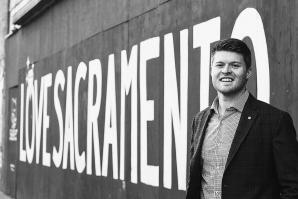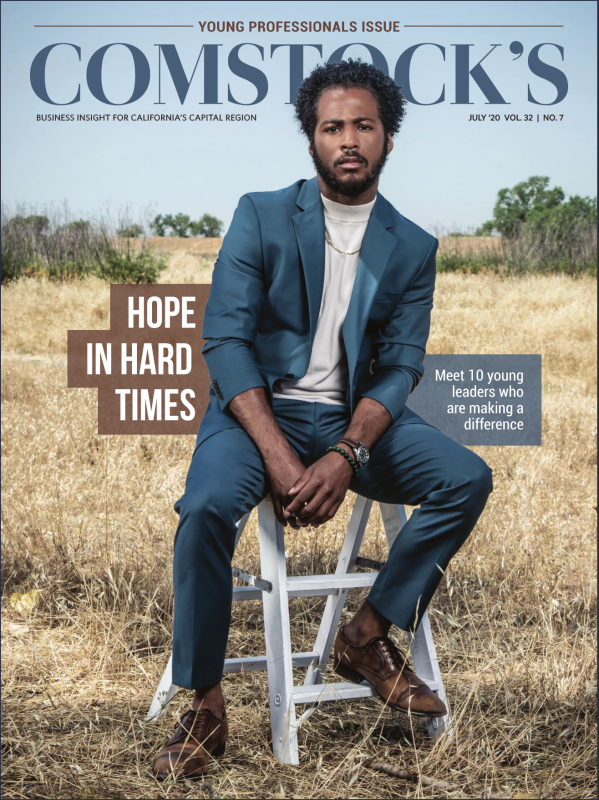It’s a story repeated a thousand ways. Amber Rosen, 37, started Breakroom Fitness in 2015 to bring exercise to the workplace. She designs fitness and wellness programs for companies and employs almost 30 part-time instructors. The Sacramento-based company had been doing well: Revenue grew from $40,000 in 2016 to about $300,000 last year. Then came the coronavirus shutdown. “We pretty much lost every single contract in about two days,” she says.
Lorena Martinez, 34, and her husband Alfonso Martinez, 37, own The Colour Bar, a hair salon with locations in East Sacramento and Midtown Sacramento. They started in 2010 with one staff person, doubling in size every couple of years, and as of March, had 22 employees. On March 17, Sacramento County issued an advisory that only employees performing essential duties should physically come to work. The next day, the Martinezes shut down and laid off all but three staff.
Josh Rubin, 37, learned from the 2008 recession. He started his company, Post Modern Marketing, in 2010 after losing two jobs in that downturn and deciding he couldn’t depend on others for an income. In 2018, PMM was ranked the fourth fastest-growing company in the Sacramento region by the Sacramento Business Journal, and as of March, had 15 staff in four locations. This was supposed to be a year of big growth and more hiring, Rubin says. But on March 16, the phones stopped ringing as states began issuing emergency orders, and the company’s revenue was cut by half in a week as clients hit pause.
The financial-planning horizon has shrunk from months to weeks for many young business owners and professionals. Even before this Grand Canyon of a recession, young professional adults under the age of 40 were up against a tougher financial future than their older peers. In 2013, professionals ages 25-34 earned 20 percent less than the baby boomer generation did in 1989, according to a 2017 analysis by the advocacy group Young Invincibles. They have significantly lower net worth than Generation X households did at similar ages, according to a December 2019 report by the U.S. Government Accountability Office. Almost 80 percent — more than in the previous generations — think they’ll have to work past normal retirement age, a March 2019 survey by the nonprofit National Institute on Retirement Security found.
Still, none of that means the rules for putting together a long-term personal financial plan have changed. For some, this pause offers a chance to revisit or create a strategy that accounts for future downturns and puts steps in place to meet their money goals. Here’s what financial planning experts in the Capital Region say young adults can think about to stay alive financially through 2020 and beyond.
Survive the Crisis
There’s nothing wrong with short-term thinking during a threat, say advisers: It helps you live another day. At The Colour Bar, the Martinezes are keeping as much cash as possible, in part by putting off paying bills for 2-3 months. Grant Bledsoe, a certified financial planner at Three Oaks Capital Management in Sacramento, says the priority now is to keep an owner’s main income source — the business — viable. “As much as we want to fund the 401(k) or put $6,000 a year into the Roth (individual retirement account) … I’m telling people, ‘Hey, it’s all right,’” he says. “What’s more important is that you still have a job to go back to and can continue pulling money out of your business to support your life.”
The Coronavirus Aid, Relief, and Economic Security Act passed by Congress in late March offers an out for those who want to sacrifice their retirement funds to stay afloat. Individuals can withdraw up to $100,000 from many tax-advantaged retirement plans or IRAs without the early withdrawal penalty or 20-percent tax withholding. Still, Suzy Taherian, a lecturer at UC Davis Graduate School of Management, strongly advises against that if there’s another option because doing so locks in the recent market losses. A better option, she says, is to take a loan against your 401(k) if you have one. The coronavirus relief bill doubled the maximum amount for loans of this type. And Taherian points out that with interest rates so low, that money is cheap now.
“As much as we want to fund the 401(k) or put $6,000 a year into the Roth IRA … I’m telling people, ‘Hey, it’s all right.’ What’s most important is that you still have a job to go back to and can continue pulling money out of your business to support your life.”
Grant Bledsoe CERTIFIED FINANCIAL PLANNER THREE OAKS CAPITAL MANAGEMENT
That also should go for attitudes toward debt generally, according to Kevin Thelen, a certified financial analyst at Prospero Wealth Advisors in Roseville. Debt serves people positively when it’s part of a plan that works for them and negatively when it’s not. “There’s nothing wrong with 25-percent credit card debt if in fact your circumstances call for that,” he says.
Plan for Post-Crisis
The coronavirus pandemic illustrates why planners emphasize cash reserves. Keeping enough cash on hand has been a priority for Rachel Smith, 34, the owner of public relations consulting firm WordSmith Communications. She launched in 2017, has had steady work and hasn’t lost clients. But she’s always operated as if they could disappear overnight. So she’s always tried to keep a six-month reserve, cutting expenses to make that happen.
That’s in line with the 3-6 months financial planners recommend. For Bledsoe, it could go as high as 24 months, depending on the situation — number of incomes in the household, age, tolerance for risk, number of children at home and so forth. Cash in a crunch also offers opportunity, says Charles Ho, a certified financial planner and the founder of Legacy Builders Financial in Folsom. In times like the present, people with excess cash can buy distressed assets at a steep discount. “Obviously, that sounds greedy … but that’s the nature of living in a capitalist society,” he says.
Once we’re through this crisis, set a goal for how much to save, say area planners, who agreed that a range of 10-15 percent of income is a good number to shoot for. Amber Rosen and her husband, Mark Rosen, are way ahead of that: They set aside 20-30 percent, putting profits from Breakroom Fitness back into the business, setting money aside for their daughters’ college funds from Mark’s pharmaceutical sales job and investing in real estate. They take modest vacations, and Amber drives her car until it dies, “even if it’s kind of clunky,” she says. Advisers who spoke for this story stressed that all situations are different, but that generally, during crises like the current recession, short-term priorities that allow business owners to survive take precedence over longer-term savings goals like college funds.
Scott Hanson, cofounder and senior partner at Sacramento-based Allworth Financial, is a fan of young entrepreneurs putting most everything back into their businesses: They’ll end up making most of their money through their business or career rather than outside investments, he says. “Business owners tend to have the time to put a lot of sweat equity in, and, at some point, can reap a pretty nice harvest if the business gets to the point where it’s acquired by somebody else,” he says. “By and large, I’m a big fan of people giving their business everything, particularly in the younger years.”
But for young owners who still will have the means to invest outside the business, planners have advice that many young adults may be skeptical of — stocks as part of their portfolio. A Los Angeles Times poll last year found only 49 percent of those ages 23-38 owned stocks, down from 61 percent in that age range in the 2001-08 period. And in a 2017 Wells Fargo survey, 20 percent of young adults said they’d never invest in the stock market. Count Amber Rosen among them. “It scares the hell out of me,” she says. The couple does have a 401(k) and the college funds invested in safe bets. Rubin says he doesn’t see the stock market as a strong opportunity, especially because the rate of return on his business, until March, was dramatically higher. He also senses a cultural taboo about Wall Street among his generation, many of whom are more politically progressive. For those in this camp, socially responsible investing can be an option. Companies included in socially responsible investment funds generally are picked for their strong policies that address issues like environmental impact, fair treatment of employees and communities, and good corporate governance.
Their hesitation isn’t entirely misplaced: Some planners think the market’s long-term performance is bound to worsen. Hanson says historically stocks have performed about 6 percentage points better than inflation. “When you’ve got inflation running at zero (percent) to 1 (percent), you probably shouldn’t expect more than 6 percent” in average long-term returns, he says. Financial adviser William Bernstein, author of a book for millennials on investing, told the Wall Street Journal in September 2019 he expects stocks to return about 4 percent a year after inflation over the next decade. There’s no guarantee the market will grow at all: When inflation is factored in, the Dow Jones Industrial Average went through two 30-year stretches of zero growth — 1929-58 and 1965-95, according to data from research platform Macrotrends.
But if the stock market isn’t growing, nothing else is likely to do better, says Ben Carlston, assistant professor of finance at University of the Pacific’s Eberhardt School of Business. When you’re 30 or 35, he says regular investing in stocks and bonds through dollar-cost averaging is still the best vehicle for growing money long term. As a 37-year-old, that’s advice he practices himself, he says.
For those who can afford it, Hanson recommends diversification, and not just within the market; he owns publicly traded stocks and residential and commercial real estate. He also says this spring’s huge federal bailouts mean taxes will have to rise, making tax diversification important too. “Have some money in tax-deferred retirement accounts, some money in a Roth (IRA), perhaps some in real estate because of the tax benefits,” he says.
Ultimately, no one strategy fits everyone. “I’ve got to sit down and learn about the person,” says Thelen. “To pretend there’s one answer for every business owner, that’s false.”
More Than the Numbers
For many young adults, there’s another kind of investing that matters: building and maintaining great business connections. For Sarah Pollo Moo, 36, owner of public relations firm Pollo Communications in Sacramento, it’s buying from local businesses — she’s keeping her online ordering local and re-upping her local professional association memberships. “A lot of us have PR contracts with (local businesses),” she says. “A lot of my peers are trying to put money back into their local community so that they can continue to have business afterward.”
Others are being flexible with business agreements. Leslie Bosserman, 36, heads up Sacramento-based Lead With Intention, which offers executive coaching and lifestyle strategy consulting to young leaders and their managers. She and her husband continued to pay their gym membership and hair salon during the lockdown, even though both businesses were closed. And Amber Rosen didn’t want to be like the vacation-rental hosts who required them to pay for reservations they couldn’t keep after the shutdown. She’s done the opposite, letting her customers out of their Breakroom Fitness contracts, though she didn’t have to.
“I feel that my business has grown due to relationships,” she says. “My hope is we’ll be back and running even if it is eight, nine months down the road. But I’m not going to sever those key relationships.”
–
Stay up to date on the effects of the coronavirus on people and business in the Capital Region: Subscribe to the Comstock’s newsletter today.
Recommended For You

Where to Get Financial Help During Coronavirus in California — and Is It Enough?
California has rapidly expanded its safety net in an attempt to catch millions of residents impacted by the coronavirus and its economic aftershocks. Have these efforts succeeded?

Getting a Leg Up in the New Economy
Comstock’s founder and publisher shares her thoughts on new innovations that may ease the post-pandemic economic recovery.

The Coronavirus Challenge
The pandemic is exposing cracks in our systems, but it’s also an opportunity to strengthen systems
Before the outbreak and spread of the new coronavirus, disruptive technologies, global competition and instant 24/7 connectivity made forecasting difficult. Today, the sheer magnitude and instability triggered by COVID-19 has made the road ahead far less clear. Or has it?

A Kick-Start for Startups
Carlsen Center for Innovation & Entrepreneurship Executive Director Cameron Law on entrepreneurship and its role in the recovery
Comstock’s spoke with Law about the ways both the center and the local entrepreneurial scene are evolving in the face of a crisis.




